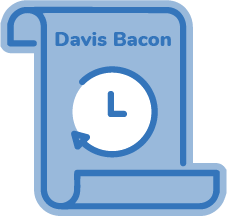Davis Bacon Act 2017
January 30, 2017 – An attempt to repeal the prevailing wage provisions of the Davis Bacon Act was introduced by Rep. Steve King (R-IA). Rep. King asserted that the provisions not only inflate wages, thus increasing taxpayer costs, but they also give unionized firms an advantage over nonunionized contractors bidding on government-contracted construction projects. The bill was referred to the House Committee on Education and the Workforce.
Davis Bacon Act 2016
March 23, 2016 – Currently sitting with the Subcommittee on Workforce Protections, the Adjusting Davis Bacon for Inflation Act, introduced in September 2015 by Rep. Jeff Duncan (R-SC), moved to increase the minimum threshold that requires prevailing wages be paid from $2,000 up to $50,000.
Davis Bacon Act 2015
July 16, 2015 – A previous attempt to repeal the Davis Bacon Act was introduced in July 2015 by Sen. Mike Lee (R-UT). The bill — referred to the Committee on Health, Education, Labor, and Pensions — not only sought to repeal the Act, but also render null and void any state that also held wage requirement (or a “Little Davis Bacon Act”) for government-funded construction projects.
February 13, 2015 – Rep. Steve King’s (R-IA) previous attempt to repeal the Davis Bacon Act was introduced in February 2015. It has since been referred to the House Committee on Education and Workforce. Similar to Sen. Lee’s attempt to repeal, this would also repeal any state’s Little Davis Bacon Act.
Compliance With the Davis Bacon Act
1. Certified Payroll – Certified payroll is essential for Davis Bacon compliance (and avoiding costly Davis Bacon violations) because they are mandatory on almost all government-funded construction, alteration, or repair projects. Certified payroll reports are submitted weekly on Federal WH-347 forms and include information about each on-site employee and a statement of compliance.
For more on certified payroll, read The Ultimate Guide to Certified Payroll

